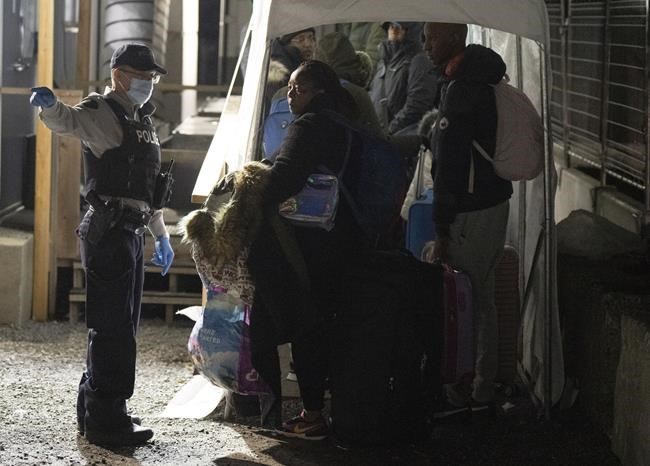MONTREAL — The closure of a rural southern Quebec road used by thousands of asylum seekers to enter Canada from the United States hasn't stopped would-be refugees from arriving, federal data shows.
The number of people claiming asylum in Canada dropped sharply after the end of March, when the government negotiated a deal with the United States to turn away asylum seekers at unofficial border crossings like Quebec’s Roxham Road. However, the numbers have been climbing back up in recent months, propelled by an increase in arrivals at Ontario and Quebec airports.
Prime Minister Justin Trudeau and U.S. President Joe Biden announced in March that they were closing a long-standing loophole in the Safe Third Country Agreement, under which asylum seekers have to apply for refugee status in the first of the two countries they enter. Now the deal applies along the entire shared border, rather than just at official ports of entry — a situation that had led to thousands of people a month crossing at Roxham Road to ensure their claims would be heard in Canada.
In June, RCMP across the country intercepted just 36 people between official border points, compared with 4,994 in January. However, the Canada Border Services Agency processed 4,350 claims in June at airports — almost all of them in Quebec and Ontario — compared to 1,370 in January and 1,360 in June 2022.
While the issue may have faded from the political spotlight since Roxham Road was closed, the head of one group that helps refugees in Montreal says his organization is as busy as ever.Â
“The numbers that we're experiencing now are actually higher than we've had in March and January and February,” said Abdulla Daoud, executive director of Montreal-based The Refugee Centre. He said his organization gets between 100 and 150 people a day seeking legal services and other help with their claims.
Daoud believes the increase in numbers at airports is due to the “current global state of affairs” that has resulted in what the United Nations Refugee Agency has called the greatest number of displaced people on record — some 110 million.
“This is our global reality and this is how the world is working today,” he said. “We have to start investing in infrastructure to deal with the numbers that we're getting, because there is no real deterrent that can be applied to stop individuals from coming in.”
Stéphanie Valois, the co-president of Quebec’s immigration lawyers’ association, sees another reason for the increase in airport arrivals. She said the federal government in recent months has “massively” increased its processing of visitor visas in order to address a backlog, resulting in more arrivals and therefore more claims.
In her opinion, the rise in airport arrivals isn’t linked to the closure of Roxham Road because "the asylum seekers coming in at the airport come from different places." She said people who entered at Roxham Road were generally from countries where it was difficult to get a visitor visa, such as Haiti, Turkey, Colombia and Venezuela. Those arriving at airports are arriving with visas, often from African countries or India, she said.
However, she agrees with Daoud that in the long run, the number of asylum seekers will rise, as more people figure out ways to reach Canada in their quest for safety.
The Canadian Press asked Immigration, Refugees and Citizenship Canada for information about changes to its visa processing but did not receive a response by publication time.
Both Daoud and Valois say they are worried about the people who are no longer able to use Roxham Road to get to Canada. Valois noted that the majority of asylum claims in Canada are ultimately accepted, which proves “these aren’t people who come here for a better life,” she said. “They come to escape persecution.”
Both also worry that those who still choose to make the journey will find themselves in unsafe situations, and will resort increasingly to smugglers to get them across the border.
Daoud says his organization has already been seeing more and more people who sneak across the border and hide from authorities for two weeks before making a claim. While the Safe Third Country Agreement now applies to people that cross between ports of entry, it doesn’t apply to those who have already been in the country for at least 14 days.Â
"We've had individuals who are just hiding in random areas, not even in shelters," Daoud said.
While they won't share data for "logistical" reasons, the RCMP say there has been an increase in covert border crossings in both the northbound and southbound directions since the new system has been put into place.
"Across the Quebec-U.S. border, there isn’t a day or a night without a police interception of some migrants (either going north or south)," Sgt. Charles Poirier wrote in an email. "For this reason, we've adapted our patrols, and we are now pursuing investigations into some smuggling networks."
He said a recent case in which a woman gave birth in the woods near Potton, Que., after her family became stranded highlights "the new reality that we are now faced with."
Chief Patrol Agent Robert Garcia of United States Border Patrol wrote this week that agents patrolling a sector of the border that includes Vermont, New Hampshire and eastern New York apprehended more than 5,400 subjects in just over 10 months — more than in the last nine years combined.
This report by The Canadian Press was first published Aug. 11, 2023.
Morgan Lowrie, The Canadian Press




